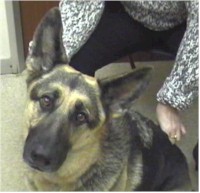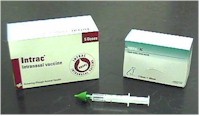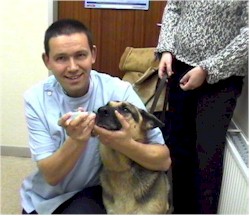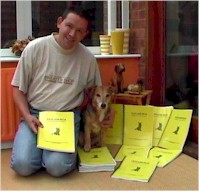| |
Prevention is the best option...
 Kennel
Cough has been doing the agility rounds.
Dogs of any age or breed are susceptible. It makes them feel under the weather, miserable and
will bring on other underlying problems in older animals. It is spread vigorously through all
forms of social contact including agility classes or meeting other dogs at shows. One
club, at least, has stopped training for the moment.
Peter van Dongen explains about this highly contagious infection in this abridged version of
Chapter 20 of his book Vets & Pets. Kennel
Cough has been doing the agility rounds.
Dogs of any age or breed are susceptible. It makes them feel under the weather, miserable and
will bring on other underlying problems in older animals. It is spread vigorously through all
forms of social contact including agility classes or meeting other dogs at shows. One
club, at least, has stopped training for the moment.
Peter van Dongen explains about this highly contagious infection in this abridged version of
Chapter 20 of his book Vets & Pets.
This
condition is officially called ‘Infectious Bronchitis’ or ‘Infectious Canine Tracheo-Bronchitis’.
It can be picked up from any dog, in the street, in the park, at the dog club, at a show etc.
It is a multi-factorial disease, meaning that it is caused by several micro-organisms, as well
as environmental conditions, such as stress for instance.
Some of
the organisms involved are the Para-Influenza virus, the Herpes virus, the Adeno virus, the
Bordetella Bronchiseptica bacterium and possibly others such as the Pasteurella bacterium. It
spreads through the air, particularly when dogs cough. It is highly contagious, meaning that
dogs can pick up the disease easily from other, infected, dogs.
 Symptoms
& treatment Symptoms
& treatment
Look for a dry hacking cough, sometimes with retching, but also inappetance and depression.
Dogs can cough for several days up to several weeks and can stay infectious to other dogs for
as much as three months after the cough has cleared up!
Treatment
is usually with antibiotics for 5-7 days, sometimes together with other drugs as well.
Remember, antibiotics kill bacteria but they do not affect viruses, so the dog may still
continue to cough for several days after treatment has started. I generally advise that dogs
are kept away, as much as possible, from other dogs for at least two weeks after the coughing
has stopped.
 The
best cure The
best cure
Preventing the spread of Kennel Cough (KC) is possible, to a certain extent, by vaccinating.
There are two vaccines on the market these days, giving protection for up to six months. These
vaccines are administered intra-nasally, which means ‘drops up the nose’, so that it will
result in ‘local immunity’, as the disease is contracted by breathing in through the nose. They
do not give total protection, as they do not contain every single causative agent of the
disease, and breakthroughs are possible. However, even in case of a breakthrough the vaccine
will give some protection and your dog will be less ill. Vaccination is particularly important
if your dog has an increased risk of catching KC (such as at clubs or shows!) or if your dog
has a pre-existing disease, such as heart disease or lung disease! The best advice is to have
your dog vaccinated every six months, just like I do with my own two dogs!
Many
boarding kennels require your dog to be vaccinated against KC nowadays and I would normally
advise you to get your dog vaccinated at least five days before boarding.
Most vets
will charge something in the order of £10 to £20 for the vaccination, which is less than
treatment would cost.
Don't forget
Whatever the incubation period of kennel
cough or any other INFECTIOUS condition - please remember that you have signed a contract with
the show not to bring your dog within 21 days to a show if it has been IN
CONTACT let alone had the condition itself.
 About
the author... About
the author...
Peter van Dongen qualified as a
vet at the Utrecht Veterinary school, The Netherlands, in March 1990. He worked in a mixed
practice in Louth, Lincolnshire for three years, before moving to Borough Green, Kent. At the
same time he limited himself to small animals only. Since December 1996, he has run a branch
practice in Allington, Maidstone, Kent.
In May
1995 Peter started agility (after years of just thinking about it!) with his Jack Russell Cross
'Basil' (a bitch!), then five years old. Since then they have qualified for many finals,
including Crufts and Olympia. Basil, Peter's first and still only agility dog, is now an
'Advanced' dog - the highest level in the UK - and still going strong at the age of 11 years!
Basil has won the coveted Crufts 2001 title in the individual Mini agility.
Peter
passed the British Agility Club Instructors' exam in October 1999 and has since done the
British Agility Club Judging Workshop.
Peter and
his wife Carry still live in Borough Green with their two dogs and two cats.
|
Vets & Pets
is a bound collection of a series of articles originally published monthly by The
Agility Voice and The Agility Eye.
All profits from the sale of the book will go to a dog charity.
To read a review or buy the book,
click here. |
From Ann Miller...
I was wondering if it would be possible to do an article or
something about kennel cough. My dogs have just recovered from it and I'm amazed at the
ignorance there is about amongst agility people.
I attended a show without my dogs and, when I explained why there weren't
there, the majority of people asked me when had they been in kennels. My dogs never go in
kennels. When I said this they couldn't understand how my dogs had become infected.
My friend also heard a dog coughing and the owner saying she didn't know what
was wrong with her dog. Good job I didn't hear her! Perhaps a bit more awareness may help to
reduce the numbers coming down with it.
(01/06/04)
| |
|